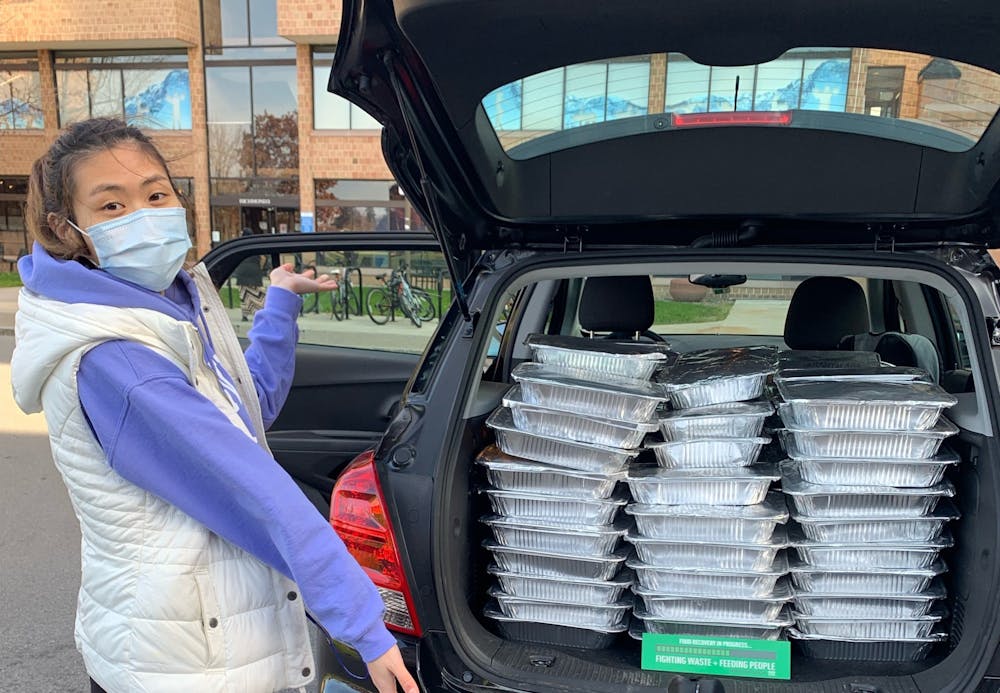Matt Taboni has always been passionate about one thing more than any other: food.
During his time as an undergrad, Taboni acted as co-chair of Blue Table, UB’s on-campus food pantry, started a Buffalo foodie instagram with his family and worked at a local Buffalo bakery. So, it seemed like the natural next step to co-found the UB chapter of the Food Recovery Network, a national student-led organization that seeks to “fight waste and feed people.”
In November 2020, Taboni, then a senior business administration major, had had enough of food waste. During his time at the bakery, it was his job to cut off the tops of cakes to make them easier to frost and layer.
“All that extra cake would be thrown in the trash,” Taboni, now a first-year MBA/JD candidate, told The Spectrum in a Feb. 10 interview. “I’m like, ‘That's stupid.’ Why are we wasting so much cake? Who wants to throw out all that cake? [It’s a] perfectly good cake!”
Taboni may not have had luck recovering wasted cake, but he did discover the Food Recovery Network, a national nonprofit focused on the would-be food waste of colleges and universities. Taboni, the current UB FRN president, and Serena Tulley, a senior biomedical sciences major who serves as vice president, separately sought to start an FRN, and ultimately co-founded the UB chapter together. Today, the organization is run out of the UB Sustainability office.
Nationally, more than one-third of all food goes uneaten, according to the U.S. Department of Agriculture. In New York State, a Jan. 1 law requires all institutions that generate two or more tons of food waste to begin donating and composting food. There are, however, limitations to donating perishable food, like the leftovers each night at C3. This food must be promptly refrigerated then donated.
Derek Nichols, the Sustainability Engagement coordinator for UB Sustainability, confirmed that the new law is impacting campus operations.
“There is a lot of infrastructure and social capital we need to put into place to comply, but UB has not taken the waiver route,” Nichols said in a statement to The Spectrum. “We’re working on complying with the law using FRN and our composting practices, and a few other initiatives that will hopefully be launched in the future.”
Sabrina Lonas, a sophomore biomedical sciences major, is currently in charge of promotion and education for FRN and got involved in the fall because she wanted to “do something fun.”
“Typically I would look for clubs that are random like ‘cake club’ or ‘bowling club,’” Lonas said. “But [I thought] I should do something that actually makes a difference because that’s kind of the point of college, getting involved in stuff that’s actually productive.”
Lonas explained that the recovery events, which take place after C3 closes for the night, are “super simple.”
“Basically, we go into the dining hall and have our little cart with our trays and scales so we can keep track of how much food we’re getting,” Lonas said. “We go around the buffet area and take the perishable food that’s leftover, sometimes it’s full extra bowls of fried rice that [they would’ve] thrown away untouched.”
Lonas says the whole collection process takes less than a half-hour most days. Once the club has taken stock of how much food is available to donate, members store the food in a fridge overnight then donate it the following morning or later in the week.
The club has currently recovered 1,758 pounds of food from its 21 recoveries.
Taboni says his club currently donates to The Response to Love Center and the Pendleton United Methodist Church but is seeking to expand its donations this semester — including to Blue Table. He says logistics are currently holding the club back.
As of now, Taboni’s car, affectionately named Trevor, is how the Network transports the food. The car can hold up to 85 pounds of food, Taboni says. The club anticipates that food banks will soon pick up food at C3 rather than have it driven to them, alleviating the logistical strain of arranging transportation.
Hazel Rodriguez, a senior studying neuroscience and psychology, joined FRN after she saw flyers in the bathroom. Now an e-board member in charge of engagement and volunteers, Rodriguez has learned more about food waste and sustainability from FRN meetings.
“[At] the first meeting, [Taboni] told us about how most of the waste comes from our own household, which I found crazy because I would have thought it was from restaurants,” Rodriguez said. “But no, most is from our own homes [rather] than from [places] like restaurants and grocery stores.”
Lonas says FRN meetings are fun and educational — their meetings can range from paper airplane competitions to brainstorming sessions for future events.
Taboni works for UB Sustainability as a graduate assistant for ‘zero waste.’ He has worked on issues like waste management, the professional clothing boutique, food recovery and UBReuse.
The club hopes to expand its reach in the future, Taboni says. They plan to collect four times a week — Monday, Tuesday, Wednesday and Thursday.
The FRN’s first meeting of the spring semester will be held on Feb. 21 at 6 p.m. in Natural Sciences Complex 218.
Julie Frey is a senior/news features editor and can be reached at julie.frey@ubspectrum.com

Julie Frey is a senior news/features editor at The Spectrum. She is a political science and environmental studies double major. She enjoys theorizing about Taylor Swift, the color yellow and reading books that make her cry. She can be found on Twitter @juliannefrey.





